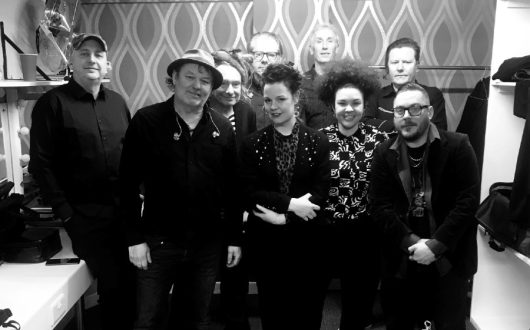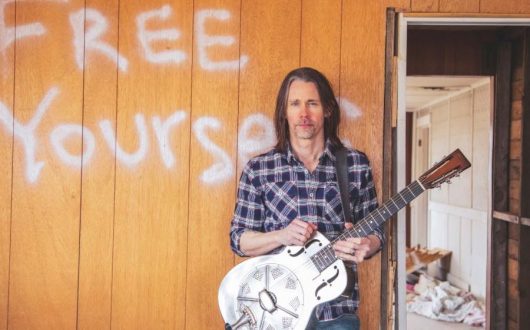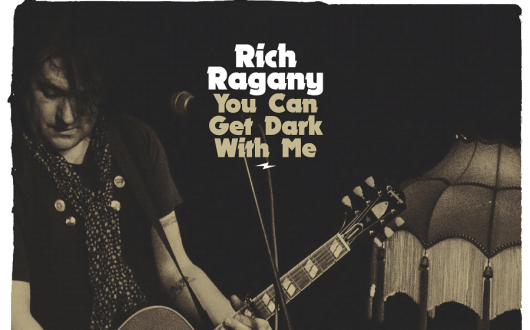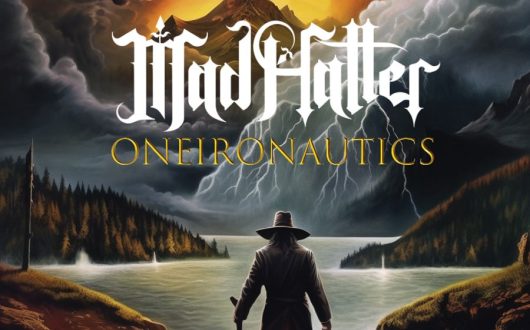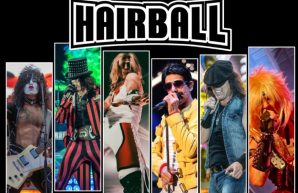Interview by Adrian Hextall
Pictures (C) Adrian Hextall \ MindHex Media
Ahead of their recent run of London dates at the prestigious O2 Arena in Greenwich and the show at Wembley arena that would finish the ‘Hysteria in full’ tour, the ‘new boy’ having only been with Def Leppard for over a quarter of a century took time to chat to us about the upcoming Last In Line release. The album ‘II’ sees the band settling into their own style and sound.
AH: I’ve been listening to ‘II’ for the last couple of days. It’s safe to say what you’ve delivered is wholly unique.
VC: Well, it feels to me like there are to two things about it, and that that’s partially why we ridiculously named it Two [chuckles]. I know there’s been that many albums as well… and partly because it’s a classic sort of thing. And it’s just… it feels like the band’s second album to me. It feels like there’s growth and development…
AH: That’s why you’re comfortable with it?
VC: Yes. Yes. So we… and secondly, it feels like we find our sound. Those songs on there… the songs to me, for the most part sound more developed.
VC: You’re listening and you think, okay, this is a rock song… You got your verse, you got your chorus, your bridge, whatever… But then they go off on these tangents, a few of them… and they take these mad left turns and go on these little musical excursions, but yet comeback. And at the same time, it doesn’t seem out a place for them to be doing that.
So I think that that’s part of the sound that we have found and developed with Last in Line. That we can do this because Vinnie is that interesting of a drummer where he doesn’t like stuff to be for concert to concert. He likes to do a three or five or seven or nine. He likes to make it weird. And we used to get… like even going back to the DIO days we used to… Ronnie was a bit like that to, would always try to throw it a little bit, make it a little bit unexpected, you know.
AH: Yeah.
VC: And with Phil Soussan playing bass… Phil is a tremendous musician. I think he’s a much more intricate bass player than Jimmy was.
Very different. I mean, both very, very talented in different ways, but definitely more of a player than Jimmy was… much more fundamental. So Phil wants to come up with interesting parts… but like Geezer Butler.
AH: Well, it sounds a little bit more… I wouldn’t necessarily say unstructured… but I mean, you mentioned the word tangents. It does go off slightly, but you pull it back, and it comes back in, but it gives you something to latch on to and listen to. Half of the songs I’ve been listening to, there’s a little underlying moment where I can hear you in the background… lingering notes, like on Landslide, for example, they’re just there in the background. You’re not just listening to a rock song… You go two layers deep behind it…
VC: Well, when we did that the Heavy Crown album. I wanted it to be very basic. Remember telling Jeff Pilson, our producer that we wanted it to sound a lot like Holy Diver. We’d record live tracks, bass guitar and drums. Put the track down live then I do a duplicate rhythm track just like we didn’t always have it and we’d pan them hard right and left. And then on very rare occasions we’d have little guitar embellishments and then there’d be the guitar solo. And that was it as far as the guitar orchestrations went. Now with Two, we went a little bit further. We know it wasn’t a conscious thing, but as we can, we’re doing the songs. Jeff kept saying, “Well, what if we did this” or somebody would suggest, “well, why don’t we try that”, and I felt more comfortable about doing that this time whereas I was very clear on the Heavy Crown record that I wanted that Holy Diver approach and I didn’t want to veer off of that path. So like, when if Jeff had suggested to me on Heavy Crown, “Why don’t we try a 12 string guitar?” I said, “No”, no, we’re not doing that… he knows, we wouldn’t have done it on Holy Diver. Whereas with this record, it was like, “Yeah, sure. Anything goes. Let’s try it.” ‘Cause, like I said, it really felt like we were naturally discovering our own side with this. So it’s a bit more layered. And there’s a bit more guitar and a few more vocal parts here and there and things going off like I say fills bass parts or… I keep going back to Geezer Butler when I think of how he played in Sabbath I guess… just more musical and a in a lot of ways just basic and fundamental.
AH: Well in the track you’ve picked as your lead single, the drums and the bass and their huge sound make that very, very notable. You don’t just play as if it was your band, driving the sound with the guitar… if anything you’ve actually picked up on the bass and the drums, to kick-start Landslide. And it does show.?
VC: It does. Yeah. Again, when we start playing these the songs as ideas, they kind of fall into it… it’s not very preconceived. And everyone kind of finds their own space. And I think, you know, as players, we’ve all been doing this for so, so many years that we kind of know…
AH: Yeah.
VC: Where we’re going to find our space. We don’t try and step on each other’s space… like there’s a spot where Vinnie’s going to play…
AH: Yep.
VC: Obviously, and here’s a space that Phil can do something and then obviously, I know what, when it’s appropriate to put in a guitar part. So with a lot of bands, you’ll find there’s a head bobbing game. They’re competing to fill the space. As a guitar player, I’ve never felt the urge to do that, to overplay you know, in fact, quite the opposite. I kind of have to coax myself to do a bit more. I’m trying to kind of sit in the background a little bit too much. As I was reminded recently, Ronnie used to call me The Reluctant Guitar Hero [laughs] because I would just be happy to just kind of sit back and do things and lead.”You know, come on, get out there and fill that hole, play more, stand upfront, do that kind of thing”.
AH: On ‘You’re the Gun’. I would say you’ve done that because of the power in the latter third of song…
VC: Yeah.
AH: …really sounds like you’re pushing yourself to really go for the guitar piece there.?
VC: Yeah. And I’m fearful about how we’re ever going to do that live because we’re a one guitar band. [chuckles] So there’s a bit…
AH: That’s a big sound, you’ve got there.
VC: Yeah. But that’s another thing… We didn’t record any or write any of the songs with a thought towards how it was going to be presented live. Whereas I think with Heavy Crown again, I’m going back to thinking where guitar, bass, drums, and occasionally we have a keyboard player but I kind of keeping it that way, with the live show in mind, with You’re the Gun in particular… I’d love to play that song live but I have no idea how I would do it. I’d have to really kind of be going back and forth ’cause the whole legacy of the latter third of the song is driven by solo guitar.
AH: Yeah.
VC: But if somebody’s got to hold the fort, then, somebody’s got to play rhythm. [laughs] Otherwise, the riff gets lost and I don’t know if it would translate to just being a bass part… and might and feel like, if any bass player can do it, it would be Phil but we’ll see. We haven’t gotten into rehearsals yet. So that’ll be interesting. But I would like to try that. So I’d love to play that live.
AH: That’d be cool. In terms of the vocals and the lyrical content that you’ve got on the album, you touch on some quite tough themes and ones that seem relevant to now as well. I mean, Landslide, of course, it’s kind of a sign onto the times where we are at the moment. I mean, I’d seen a note from Andrew [Freeman – Vocalist] talking about dealing with adversity, manipulation through media and leadership. You’ve also got that on there with ‘False Flag’ as well later on in the album. It’s very topical..
VC: Yeah, well, I won’t speak for Andy he wrote all the lyrics, but yes, it is a dark record lyrically. But Andy like I said, I won’t speak for him but I’ll give my opinion. And as a lyricist… I mean, Andy would tend to gravitate towards that and I think it suits his personality more. He’s more conscious of what’s wrong in the world, as opposed to what’s right in the world. He’s not going to go on about sunshine and rainbows…
VC: Even if they’re there, that’s just not Andrews outlook on things but it is a very, very dark time in which we live. So I think it’s Andrews time as a lyricist to reflect that and this is a great opportunity and platform for him to do it. And I really think he has done it.
AH: As far as those darker lyrics are concerned, does that mean that you have to approach the music in a different way as well? Because presumably you can’t put sunshine and rainbows into the sounds if the lyrics don’t match up with it.
VC: Well with Vinnie would never let that happen for one.
AH: Yeah.
VC: I had a really, really good riff for this album and I played it for the guys and we kind of jammed to that… and I could tell, with Vinnie sitting there… I could just tell by the expression on his face, “So Vinnie, what’s wrong?” He said, “It’s too happy” [laughs] So now, it’s it’s in my back pocket, and I’m going to play it for Def Leppard. So, it may appear on the next Def Leppard record because I still believe in the riff, I think it’s the basis of a good song.
VC: But Vinnie would never let anything happy work its way onto a Last in Line record. Like, even in back in DIO days, when we played songs, like Hungry for Heaven and stuff, like that the happier DIO songs…
VC: I mean, I could tell Vinnie wasn’t happy about that. And I didn’t think it necessarily suited Ronnie and suited the band, but it was a thing that we did, and it was successful, so, I guess we shouldn’t knock it. But yeah, Vinnie is always leaning towards the dark and the ominous side of music. And again, like, more interesting, he doesn’t like things to be structured or modular. It has to be kind of offset and wacky, time-wise for Vinnie… and changing beats, changing time signatures, throwing in half bars, half bar measures… stuff like that. And lyrically and musically always, it’s going to be on the dark side. And then that’s just as part of this band and its resolve… it was going to go that way, lyrically. And as a guitar player… I always find it easy to channel that. Ever since I heard that flat, and fifth thing with Jimi Hendrix…
VC: [vocally mimics guitar sounds]
AH: Yup.
VC: It’s like, “Whoa”. The devil’s music they used to call it.
AH: Presumably, though, anything on the lighter side, you can push to Leppard instead.
VC: Well Def Leppard can get away with doing happy. It’s a different mindset, and that’s fine. So, yeah, so, like I said, that riff, we started jamming on the happy one and Vinnie [chuckles] was like, “Well, it’s good, it’s just not for us” so…
AH: Presumably, if you hadn’t worked together before when you were all in DIO, then it would have been a difficult thing for you to adapt to. If you’d said, well Vinnie is free. Perhaps he will come and play drums for us. But if you’ve not worked with him before, you wouldn’t have necessarily appreciated it… his approach… That could have been quite difficult.
VC: Yeah…
AH: But obviously, with the past history you’ve got, it’s a lot easier.
VC: But even like the first night, Vinnie and I ever played together with Jimmy been back in 1982 when I auditioned for DIO.
AH: Oh, yeah.
VC: I mean, it was… there was a real connection between us when we played like, I mean, from the very, very first bar…
AH: Yeah.
VC: We were in a rehearsal room here, in none other than John Henry’s, and I had a rented a Marshall and my Les Paul, Vinnie had a rented kit, and Ronnie had left Black Sabbath… with Vinnie and he had one and a half songs. He had Holy Diver written and he had half of Don’t Talk to Strangers written. And Ronnie picked up Jimmy’s base and he showed me the riff for Holy Diver, and that’s what we played. But as soon as we started playing, it was like, “Oh,” we all kind of think,”Oh, this is something good here.”
AH: It was.
VC: Something really works. Yeah. And Ronnie was rolling a joint. I remember. He looked up as soon as we started playing, stopped licking the joint, and then actually started recording on cassette. So that was always there. And Vinnie… I’ll say two things about Vinnie Appice. He’s number one… he’s a wonderful human being… like, I was very starstruck when I walked in to meet Ronnie that first time… I was 20 years of age. I just as nervous kid from Belfast, even Jimmy I didn’t really… I’d met him a few times. But he was still a rock star to me, you know, and I was kind of uncomfortable because he was this big rock star and Ronnie was just off the charts. Now Vinnie I… to be honest, I didn’t know… I wasn’t aware of his playing. I knew he’d been in Sabbath. I knew his brother played with Rod Stewart. But as soon as I met Vinnie… he’s a wonderful human being and very funny and warm. And he made me feel comfortable.
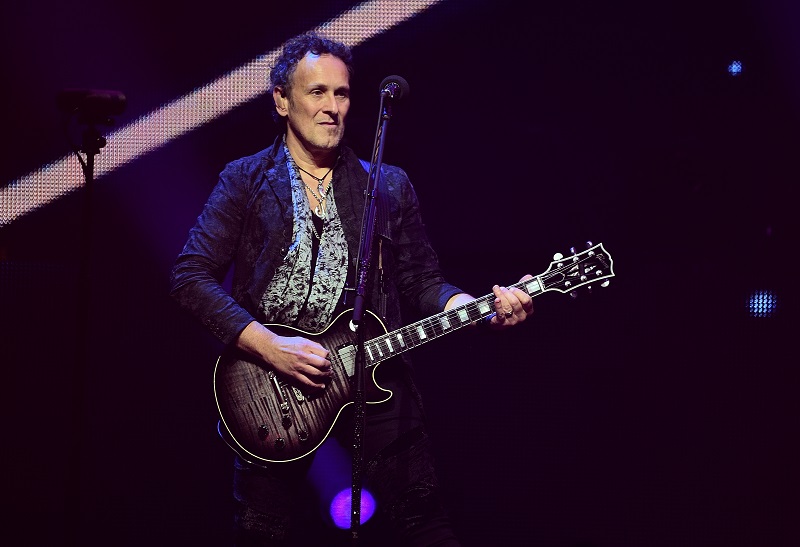
AH: Yeah.
VC: So that kind of really helped me settle in and play with these rock star guys. And then I also very quickly came to find that he’s such an inspiring roamer to play with. He really keeps you on your toes, he really challenges you as you play… either, as a guitar player, as a bass player, especially with bass players, he’s always pushing. He’s always like throwing stuff in… like, you can’t be phoning in your game. When you play with Vinnie, you have to be conscious, you have to have both ears open, both eyes open, and be aware of what’s going on, or what potentially could happen, because Vinnie throws this stuff in. And that’s what makes it so exciting to play with him. Even to this day, even when we play Holy Diver with the Last in Line band. We play Holy Diver, or Last in Line itself, a song that we’ve played for decades. He’ll still will still occasionally throw in something entirely off the wall at random, like go half time or go double time, or just go on this mad fill, but he always comes in on the downbeat. So you can you can hang your hat on where his down beat is with Vinnie. He’ll always bring you back.
AH: But that’s got to put a smile on your face when you play because, you know, it might happen. And when it does, actually, they’ll catch there’s it’s something slightly different this time.
VC: But that’s what’s great about live music. And Last in Line are one of those bands that really kind of.. we do on occasion, like, totally go off on this, not this mad tangent… But you know, we’ll take a little diversion in the live show. It’s live, and it’s just it’s happened. It’s not rehearsed. It’s just happening in real time. And we’re all going with it. And we’re all on the same wavelength or we can control it. And we managed to get away with it. So these little moments like that… that make it all so special. And that’s what you live for as a musician… these moments of just sublime inspiration.
AH: But as a fan, we do as well. The bands that you go and see, you might only catch them once every couple of years or something like that. It’s got to be memorable. You don’t want to see them, and then two years later, see an identical show. It’s gotta have something to catch each time, doesn’t it?
VC: It does…
AH: And then you get the reputation. It’s like, they’ll never do the same show twice.
VC: Yeah, that is a great thing about live music. And like I said, playing with Vinnie really inspires me… really elevates my game. I want to be a better player. I am a better player. When I play with people like that and it’s fun. It’s just, it’s really cathartic for me. And that was a whole reason why I went back to Jimmy and Vinnie back in 2011 and called them and said “You want to play again”. I was at a stage where I had rediscovered that passion for guitar again, that I think I’d lost for a while. Just because when something becomes your job, you settle into a level of being able to do it but not necessarily being too inspired by it. You have your moment so. But in 2011, I got the chance to be a stint guitarist with Thin Lizzy for a few months and just being on stage with Scott Gorham and Brian Downy and playing the songs of my youth. Because Lizzie’s music was so important to me and my developmental years when I was a teenager listening to Jailbreak, listening to Live and Dangerous, listening to Black Rose and learning to play those parts. And then to be on stage with the guys and Lizzie playing those parts. Just like, “Yeah”, this is– I felt 17 again and it was after that I came back from that tour that I called up, Jimmy and Vinnie and I said, you want to go into rehearsal and then play? But beyond that, I just wanted to play with them again, and do that. And at that point in 2011, that have been about 27 years since we’ve done that since we played together and, and it was just like that first night, at John Henry’s when we walked in. We started playing and it was like goosebumps. It was like immediate. It was a sighting of the DIO band all over again.
AH: You’re at such a popular venue, John Henry’s as well… It’s from the old school..
VC: It’s the old school, yeah. It’s from one of the eras, that they… you all think of, yeah. You’ll go back to where… where they felt comfortable.
AH: Definitely.
VC: So, that one thing led to another. And then, you know, the band grew out of that. And Vinnie he said,”You know, we need a singer to make a complete” and he said, I know this guy, Andrew Freeman, lives close by. Andrew was still living in LA at the time. He’s in Vegas now. So Andy comes and he starts singing. And that’s when I had the idea to take it outside of the rehearsal room because here was a singer who sounds nothing like Ronnie…
AH: Yup.
VC: But had balls and power in his voice, which you need to sing on top of the racket that we make. And I thought,”Oh, this sounds really interesting”, you got the unmistakable sound of Vinnie, me, and Jimmy… the early DIO band…
AH: Yeah.
VC: And then you get this singer who sings nothing like Ronnie but has an interesting interpretation of it. So and that’s what I said, let’s go out and do some shows and play the songs… Ronnie had passed away about a year before, so it actually makes perfect sense… we’re the last in line, let’s just call us that. So that was it. And we had no ambition, other than just play some shows. And then that’s what we did regional shows. And then, we got a chance to come over here and got a chance to go to Japan. And few months later, we get a call from Frontiers saying, “Would you be interested? We will give you a budget. Would you want to write and record some of the music?” But up to that point, we really didn’t… it was a side project to everyone. And it still is, but it’s a very serious side project.
AH: Well, the calendar, the musicians involved, it can’t be anything other than a serious side project.
VC: Yeah. But I mean, we’re really invested in it. You know, I mean, we could have just put records out and not done any shows. I’ve never been so busy as I’ve been in the last several years in my entire career. But I’m happy to do it because I also really… I had a cancer diagnosis a few years ago, which really kind of, I think, made me see a lot of things in a different way, and also really accelerated the pace at which I want to work. So, it’s important to me to do that and… I like… all of this year, like, from January of this year, I’ve been doing shows will Last in Line right up until a week before I started rehearsals with Def Leppard for this tour. And the same things happening next year. We finish a week before Christmas here in the UK. And exactly four weeks later, I’ll take four weeks off for the holidays. But then I start with Last in Line and I’ll be doing shows right up until I start with Def Leppard again. So, you’ve got to do it. You can’t just put a record out any more, you have to show the intent, you have to work it and I… it matters to me that I think I believe enough in the quality of what we’ve done with Last in Line with these two albums that we have to take it to the next level. And the only way it’s going to happen is to get out there and pound the pavement and do the shows. And I love too. It also a genuinely a catharsis for me. It’s hard, hard work because we don’t have the luxury of anything that a Def Leppard show has.We don’t have the budget, we play in clubs, staying at a Holiday Inn Express, if you’re lucky, [laughs] flying crappy airlines, discount airplanes,and travelling in a Sprinter van, and getting no sleep and eating cheese sandwiches every day. But it’s when you get on stage…
AH: Old school?
VC: Yeah, but when you get on stage, and you’re playing, and you have those moments where the band’s just locked… then just going on these musical tangents. And you see the smiles on people’s faces,and you just… you feel the energy of the music in you… that’s all that I ever wanted to do. I’m very fortunate that I’m here tonight at the O2 Arena with Def Leppard, and I get paid for it.
AH: Yup.
VC: But I’m willing to do it for free still. So it’s all good.
AH: No, I definitely get that. Very last question. You mentioned the diagnosis. You were starting immunotherapy at that time?
VC: Yes.
AH: All going well?
VC: Yeah, I’m still doing the same therapy that’s worked for me. Yeah, at the time when I first started it. That was three and a half years ago. And it was part of a clinical trial for the FDA. And then about a year and a half ago, it was approved, and the drug is now on the market. And I’m continuing to take the drug. So it works for me, it’s holding everything in place. I have to have regular infusions. I’m supposed to do it once a month. But given my touring schedule, I do it every six or seven weeks, and my doctors are happy enough to let me do that for a couple reasons. Number one, they know that work is very important tome. And that’s a big part of the process too. And number two, I’ve been on it so long. And I’ve responded really, really, really well to it, more so than most people. Some… I’m a bit of like a poster boy for this particular drug. Because I was there to start and, and my case is a bit of an enigma to all these oncologists, because I just… I suffer no side effects from this particular drug. And a lot of people get nausea and constipation and fatigue. I get a little fatigue around the infusions. But other than that, my, my doctor is just amazed at how… He says, “where are you coming from, where are you going next. how do you do this?” And it’s what I do, you know, it’s so… but even when I was doing chemo, I was still on tour and stuff. But that was different, all I gotta say. But it’s… you know, it’s always been, I think part of the dealing with that is the mental process too. It’s always been the least important thing to me. I mean, I get that it could kill me. But I’ve never really stopped to think about it, you know, and I’ve never put that stock in it, I’m going, “Oh, I need to do this. I need to cover myself in bubblewrap and cotton wool” you know, I thought “Fuck it. I’m having a whiskey, I’m going to do a show.” And and it’s part of my stubborn Irish reluctance to, to capitulate to it, you know… but my work really genuinely does… it gives me motivation, you know, to keep going…
AH: It’s the will to keep going. Yeah?
VC: Yeah. So, and I’ve been very, very fortunate with it… with this particular drug, because it only works for certain people. And I’m just one of the lucky ones. I’ve been really fortunate with it… so, all good.
AH: That’s the best piece of news I’ve heard. That’s wonderful. Because I wasn’t sure you know, but you look really healthy. So thank you.
Last in Line II can be purchased here:



